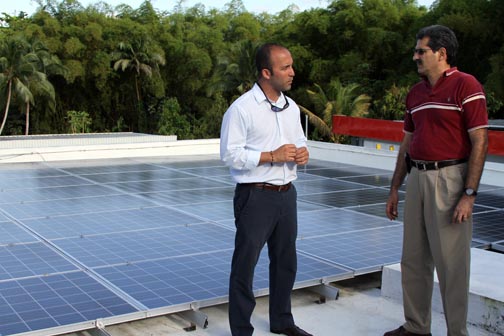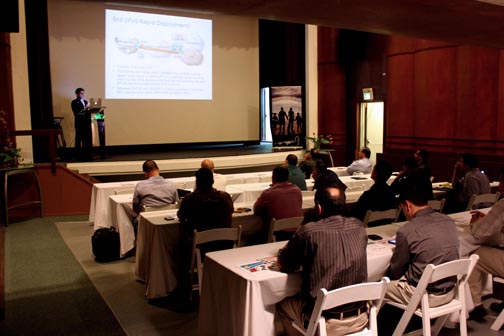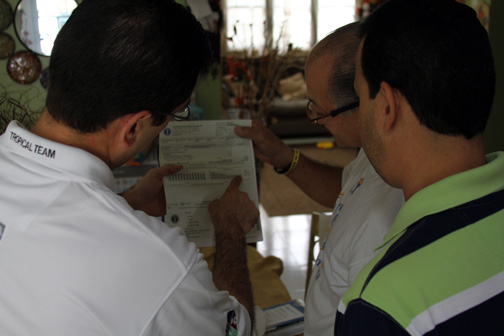Transition report: Gov’t used ARRA funds to cover gaps


“In terms of visibility, sectors receiving fewer resources, such as energy-related programs, seemed to have most of the media attention, ignoring the fact that the government was using the money to pay for ordinary and recurring expenses in the respective agencies,” the report further noted.
Puerto Rico received $7 billion in American Recovery and Reinvestment Act funds in 2009, but failed to create and retain jobs and renovate infrastructure as they were supposed to because hundreds of millions of dollars were used to cover the operational deficiencies of a handful of government agencies.
So concluded members of the current administration’s transition committee, which included the findings in a lengthy report released late Friday, more than a month after Gov. Alejandro García-Padilla took office.
The 77-page document stated that about $3.4 billion in ARRA funds were distributed through several agencies in the form of grants, another $1.4 billion was distributed to individuals through the Treasury Department, while federal agencies in Puerto Rico got $1.4 billion. Meanwhile, the Labor Department received $337 million to extend unemployment benefits, private and nonprofit organizations received $143 million, while municipalities split about $129 million.
When broken down, five federal agencies disbursed 82 percent of the grants: Education (50 percent); Housing and Urban Development (11 percent); Health (9 percent); Transportation (7 percent); and Energy (5 percent.)
“In terms of expenses by category, education was the area that received the most money, followed by infrastructure and housing. It’s shocking that infrastructure spending was around only 11 percent of the grants and 5 percent of the total investment,” the report stated.
“In terms of visibility, sectors receiving fewer resources, such as energy-related programs, seemed to have most of the media attention, ignoring the fact that the government was using the money to pay for ordinary and recurring expenses in the respective agencies,” the report further noted.
The report signed by the 12 members of the García-Padilla transition team also noted that while infrastructure investments throughout the U.S. mainland accounted for about 11 percent of the total ARRA funds received, Puerto Rico used about 5 percent for that purpose.
“As previously stated, this type of investment has a job-creating effect that would have helped to reverse the trends of economic contraction at the beginning of term. This could explain why ARRA did not have the same multiplier effect [in Puerto Rico] than in the U.S. mainland,” the report noted.
Irregularities detected
As required by federal law, agencies managing ARRA funds had to conduct audits to gauge the effectiveness of the funds and identify misuse. In its findings, the transition committee noted that Education and the Labor Department’s audits revealed “serious irregularities.”
Education disbursed about $1.7 billion of the ARRA funds Puerto Rico received. But, in December 2010, the agency’s Office of the Inspector General pointed out loose management and a lack of monitoring over the use of the funds.
“The Puerto Rico Education Department and the Office of the Governor did not sufficiently monitor the use of ARRA funds and the sub-grantees to guarantee adequate supervision,” the report noted. “Education was not effectively managing the procurement process.”
Education spent $1 billion in ARRA funds in 2009, of which $442 million were destined to the so-called Budget Stabilization Fund.
“Twenty five percent of those funds, or $117 million, were used to pay for ‘government services,’ in other words, non-recurring funds were used to pay for recurrent expenses instead of making long-term investments,” the report stated. “Furthermore, it was determined that Education applied upfront reimbursement for expenses whose payments had yet to be made.”
As for the Labor Department, the committee concluded that that funds assigned to the Workforce Investment Act fell short in creating the expected jobs. Audits into the program revealed “deficiencies including omissions and inconsistencies that add up to millions of dollars.”









The defeated pro-statehood political party headed by ex-governor Luis Fortuño operated like a mafia family and the U.S. Attorney should “follow the money” investigating the situation “en situ” themselves sending stateside investigators because it is known to all on the island that the local FBI Office and the local U.S. District Judges, are infested with pro-statehood activists, who avoided investigating the Fortuño administration.